- Home
- Gregory Maguire
Missing Sisters Page 5
Missing Sisters Read online
Page 5
“You heard me.”
“Why?”
“There’ll be a memorial service for Dr. King.”
“He’s a doctor too?” said Garth, mouth open with joy.
“He isn’t a personal member of our family!” cried Miami. “What’re we gonna do, fly to wherever they just kill like that and act like crazy people? I’d be so embarrassed!”
“The cathedral will have a service, I’m sure,” said Mr. Shaw, who worked for the Church in some mysterious capacity having to do with banking and budgets. “They’re already lining up something for Saturday evening. Sorry, sweetheart, but your mother’s right. We must go and pay our respects and pray for his soul. He’s a good man, a hero, and he needs our prayers.”
“If he’s so good, why’s he need our prayers?” Miami was getting loud, and the little girls began to whimper. She was going to dig her heels in over this! “It’s not fair! It’s my birthday party on Saturday! You promised! He isn’t even a Catholic!”
“Honey, it can’t be helped. We’ll have your birthday party next weekend.”
“But that’s the beginning of spring break!” And the O’Haras would be going to Pennsylvania over spring break, Miami already knew. “It can’t be then! It has to be Saturday!”
“This is an emergency, and in an emergency everybody has to pull together and make sacrifices,” said Mrs. Shaw. Her tone was changing. “It will mean something to Garth that we go.”
“You don’t care, do you, Garth? You can come to my party. Promise!” A last-minute change of tactics. “You’re my favorite little brother. I’ll let you have all the hot water in the bath tonight.”
“You were going to smush me with a giant rock,” said Garth.
“I was only joking,” said Miami, grinning broadly, with painful brightness, as proof.
“It doesn’t matter what Garth says,” said Mr. Shaw. “Honey, try to be grown up about this. We’re going to go as a family to the memorial service. Dr. King deserves our honoring him that way. It will be important to Garth, later on, to know he was there and we were there with him. That’s what Dr. King was working for. That’s what we’re doing.”
“We’re not!”
“Discussion is over,” said Mr. Shaw, more tired than annoyed. “That’ll do, Miami Shaw.”
“I hate you all,” said Miami. “With a very special hate. You have just ruined the rest of my life. Thank you very much with whipped cream and a cherry on top.” She pushed away from the table and ran back to the tower. No one called after her or followed with a worried look to see if she was going to pitch herself out the window. What did they care! Just to spite them she wouldn’t even do it. She’d stay alive and inflict herself on them for the rest of their natural days. The big, fat, stupid jerks. Garth more than anyone.
Two evenings later Mr. and Mrs. Shaw and Miami and Garth drove downtown to the Cathedral of the Immaculate Conception. Patty had come over to baby-sit Fanny and Rachelle. Miami huddled as far into her corner of the car as she could. She wore a scarf on her head even though the teachers said you didn’t have to do that anymore. She didn’t want anyone she knew to see her.
Garth was already over the novelty of a black king and could feel in his bones a long, boring church evening ahead. At first he had tried to jolly Miami up by dancing, but Mr. and Mrs. Shaw were so drawn and sorrowful that soon he just gave up and looked morose, too.
The church was packed; folks crowded into the aisles and the choir loft. It wasn’t even a holy day of obligation or a Sunday. Miami didn’t listen much to the readings or the sermon, but she stood on the kneeler to see around as far as she could. The place was full of nuns. Some had the new modern habits, but a lot of them were sticking to the old crowlike gowns and bibs. There were even a couple of dark, sensuous-looking sisters in pale blue veils with gold embroidery, whose habits were wrapped like sheets around their waists. They wore brass bangles and had red dots on their foreheads. If I were ever dumb enough to want to be a nun, that’s the kind I’d be, thought Miami.
Every Catholic in Albany must be here. There were black people and white people, and yellow, and everything in between. Mrs. Jenkins, the witch from next door, was two pews over. The O’Haras, all nine of them, were there. Billy included. So that was all right; he wouldn’t have been able to come over with the geography book anyway.
They all sang together. Even Miami sang. “We shall overcome,” they sang, and held hands in church. She held Garth’s hand. “I still hate you,” she whispered to him in a loving tone. “I hate you, too,” he said, “but don’t you hate this even more? It’s so boring.” They squeezed each other’s hands in joyful contempt. Mr. Shaw and Mrs. Shaw were crying, the Bobbsey twins of South Allen Street. The whole thing was totally embarrassing. “Oh deep in my heart, I do believe that we shall overcome someday.”
Part Three
SMITHEREENS
Underwater, Alice was no deafer than anyone else. Velvet silence. Liquid light. What she could see of the world was a broad-brimmed plate; she wore it like a hat. A hat decorated with scraggly pines, run around with ribbons of cloud, pinned with skewers of sunlight. Yet for all that, it had no weight. She jostled her hips this way and that way, as if doing a hootchy-kootchy dance, and the world wheeled overhead in perfect balance.
Then she shot up for air with a whoosh.
The world clicked back into place. The shallows of the lake were churned by a hundred splashing, shrieking girls. Their screams knotted together into a big ache in Alice’s brain. The counselors—nuns in training, mostly, though stylish in pedal pushers and culottes—paced the dock, blowing whistles whenever anyone’s life was threatened by too much watery exuberance. “Fabia Lanahan! Stop doing that to Mary Jane Jones!” Alice flicked her hair expertly back with a toss of her head and grinned wildly at no one. Then she plunged deep into her element.
It was the third day of her two weeks at Camp Saint Theresa. The weather was good, the food disgusting and plentiful, and nobody else in her cabin came from the Sacred Heart Home for Girls. Some of them were such chatterers they hadn’t even realized yet that Alice couldn’t speak well. So she sat on the bunk at night, making a wallet from prepunched plastic leather stitched with plastic cord for Sister Vincent de Paul, if she ever came back. The cabin leader was a large woman named Sally. She believed in regular bone-crushing hugs, morning, noon, and night, and the girls submitted as a kind of penance. Other than having to satisfy Sally’s need to feel motherly, Alice found camp safe enough. Of the stink-hole bathrooms—no more than toilet seats perched above gaping holes—it was best not to think.
Alice wasn’t used to being on her own as much as camp allowed. For as long as she could remember, there’d been nuns hovering within a few feet, encouraging, reprimanding, consoling. A mobile forest of women shaped more or less like Christmas trees, though done in black and white instead of jeweled colors. (The nuns at the Sacred Heart Home for Girls had not yet embraced the new stylish habits, with their scandalously shorter skirts and civilian-style blouses.) Nuns were a fact of life, like crucifixes marking their holy quadrants on the walls, or telephone lines crossing the sky in imprecise musical staffs. Nuns persisted. They weren’t so much a motif in Alice’s life as an element of nature, like air or dust or birds.
So down, down, into the lake the color of liquid Prell, and Alice was like the pearl in the TV commercial that dropped slowly, silently. On its own agenda, as Sister John Boss would say. Alice propelled herself like a frog, like an Egyptian doing the bent-arm dance as a swimming stroke. Alice could keep her eyes open underwater. She was as sharp as Flipper. There, for instance, through the gloom: There was Naomi Matthews pretending to swim with little pouncing hand motions hitting the water. Alice could see her feet touch down for nervous assurance every eight seconds or so. The big cheat.
She butted up into Naomi’s side. Naomi gave a little squeal even Alice could hear. Alice stood up, water streaming down her hair. “Oh, Naomi. Sorry.”
“Watch
where you’re going, clumsy,” said Naomi. She was trying to swim without getting her golden mane wet.
“Swim tag! You’re it!” screamed Alice, and splashed Naomi in the face with water. She tapped Naomi lightly on the shoulder and darted away with a muscular side-stroke. But Naomi wasn’t biting. “Oh, Alice, grow up,” she groaned. “I’d like to take a calm swim for a moment if I can.”
“Can you swim?” said Alice daringly. “Don’t look like any kind of swimming to me.”
“Taking a break on your speech lessons for the summer, I guess,” said Naomi deftly. “I can’t quite make out your comment so bye-bye for now.” She fake-dog-paddled away. Even her shoulders rose like little porcelain doorknobs over the water. She couldn’t fool a blind person with that act, thought Alice scornfully. At least there’s one thing I can do better than Naomi.
Alice had been surprised to see Naomi here, at the jamboree barbecue that opened the two-week camp session. Naomi had triumphed in the Sacred Heart–Saint Mary’s joint production of My Fair Lady. Naomi had gone to glory in her half of the role, as Eliza Doolittle transformed into an articulate lady. Then she had moved out to live with the Harrigans. She’d taken all her things in a gray suitcase with the stitching coming out of the leather reinforcements. Alice had watched her leave. Mr. Harrigan had carried the suitcase to the car; he was so short it almost dragged on the sidewalk. Mrs. Harrigan had fluffed and plumped and kissed the air around Naomi, as if terrified yet to come in real contact, in case Naomi would change her mind before the getaway car had a chance to roar into the sunset. It seemed like a living nightmare to Alice, watching from the window on the stairs. Naomi looked more embarrassed than anything else.
She’d sent back a couple of letters to say she missed everyone. “Even Alice!” she’d added in a PS. “Can ya believe it?” She’d told of a life of great luxury. Her own bedroom. A new school. Freedom to call up friends on the telephone. Most enviable of all, her own alarm clock with a transistor radio in it. “Pop music is fab,” she’d reported. “Ya should hear it! Ya’d love it.”
“Her grammar is deteriorating,” clucked Sister Francis de Sales. “You girls would do best not to envy poor Naomi too much. There’s no equaling the kind of advantages you have, believe me.”
On the whole, the girls did believe her. Naomi Matthews was the kind of girl things happened to, that was all. She’d probably grow up to have a cooking show on TV or something professional like that. But there could be deep sorrow in the future, ready to snare her when she got too happy. Especially if she forgot she’d started out in a girls’ home like the rest of them. The girls left behind were patient. They could wait for fate or the devil to trip Naomi up. The more joy she had in youth, the worse it would be for her later. They pitied her, really.
At the opening barbecue, Alice was astounded to be lassoed with a pair of sunburned arms, to have her face burnished by an ebullient crisp structure of hair. The permanent wave was a novelty, but the color could only be Naomi Matthews. And there she was, acting like a long-lost best friend. “Alice Colossus!” she was shouting. “What’re you doing here!”
“You know,” said Alice, mumbling more than usual in her surprise. “The girls of Sacred Heart get to go to Camp Saint Theresa. You did, too.”
“My parents thought I’d love to do something from my old life,” Naomi babbled on, “and I said, well, why not Camp Saint Theresa? I hoped somebody I knew would be here! Are you around for more than one session?”
“No,” said Alice.
“Me either,” said Naomi. “What a gyp. It’s not as if they don’t have the money. They just love me so much they can’t bear for me to be gone for more than two weeks.”
“Oh,” said Alice. “How’s the lady? The lady acting like a mother, but she don’t do it so good?”
“My mom,” said Naomi severely. “She’s fine. She’s a little—uh. Well, she’s not exactly Donna Reed. I mean, she cries a lot. She’s okay. How’s Sister Vincent de Paul? She back yet?”
“Not yet.”
“Anyone else here from home? I mean from the home?”
“Ruth Peters and some of her dormitory friends are in the junior camp.”
And just then Ruth Peters had run up, having sighted Naomi from across a couple of picnic tables. She burbled like a water cooler. With a shriek of joy she climbed into Naomi’s lap and began to suck her thumb for all it was worth. Ruth hadn’t liked Naomi much, but she was already homesick and glad to see another familiar face. After a couple of minutes she switched to Alice’s lap.
“Well,” said Naomi, “better go back to my table. See you around, Alice.”
“No—don’t go!” protested Ruth, who was capable of having a screaming fit at the slightest separation from anyone she knew.
“Only over there,” said Naomi. “Honestly. She hasn’t changed a bit, has she?” She winked at Alice. Alice felt faintly affronted by the wink. It had only been six months. How much was a now-five-year-old supposed to change in six months? Yet Naomi seemed to have become a certified teenager. Even her breasts seemed more confident.
Naomi had figured out who was who and latched on to a squadron of slightly older girls, who sneaked lipstick on at night though it wasn’t allowed. Alice made the mistake, only once, of trying to hang around with them during a free period. They’d arched their eyebrows the first time she spoke and exchanged glances with Naomi. Alice had wandered away then, down to the lakefront, to immerse herself in a lake that didn’t express any objection to her. And her spirits righted themselves there.
So for a week she stayed more or less on her own. With her long legs, she was an asset on a basketball team and enjoyed the evening game when the supper slop and after-dinner announcements were done. In the skirmishes between the eight girls on each team, a faint gray dust was raised from the bare soil on which they played. The dust hung in the sloping light, and Alice lunged through it dribbling and dodging, but not so engaged that she didn’t suddenly remember the strange light in the kitchen on the morning when the retreat center burned down. Alice made a basket. Maybe the wreck of the retreat house was around here somewhere? It had been in the mountains, a couple of hours by school bus, like Camp Saint Theresa. “Way to go, Naomi!” screamed her teammates, who seemed to have confused Alice with her more glamorous acquaintance. How they did this was a mystery, as Naomi was giving Alice a wide berth now.
That was the first week. Then the camp director announced a talent show to be held on the night before the session ended. Naomi cornered Alice on the way out of the mess hall and said, “I got a great idea! You and me could do the Eliza Doolittle thing! We already know our parts. You can sing ‘Wouldn’t It Be Loverly’ as ‘Life Would Be So Heavenly’ and then go offstage, and I’ll come on and sing ‘I Could Have Danced All Night.’ But we got to find someone who knows how to play the piano or something.”
“Nah,” said Alice. “Once was enough.”
“We’ll be brilliant,” said Naomi.
“It makes me feel stupid to be the dumb one.”
“First prize,” said Naomi, “is fifty bucks. We could split it.”
“Well,” said Alice. “We got to give some to the piano guy.”
“Deal,” said Naomi.
“Deal,” said Alice with a sinking feeling.
In the second week of the session Alice tried to become chatty with Sally the cabin leader. As a nun in training she might know something about Sister Vincent de Paul. But as far as Alice could figure, if Sally was aiming at being a nun she wasn’t going to make it. She smoked cigarettes and sang Beatles songs to herself while she pinned her hair around plastic rollers the size of beer cans. She said to Alice, “In this business I know as few nuns as I can get away with.” At least that’s what Alice thought she said. “Sister Vincent de Paul?” said Alice again faintly. “Never had the pleasure. What order is she?” asked Sally. “Redemption.” “Hah!” said Sally contemptuously, “Redemptions! The living end!”
Naomi had identifie
d a piano player, a timid girl from Schaghticoke called Wendy Beasley. Naomi had threatened to pull off Wendy’s bathing suit in the lake if she didn’t agree to accompany them in selections from My Fair Lady. Wendy, suffering a nearly terminal case of modesty, succumbed to the pressure. Alice thought that family life wasn’t having a healthy influence on Naomi Matthews. “By the way,” she said one evening, “are you Naomi Harrigan now?”
“Ow oo Naomi Howwigan,” parroted Naomi. “Sorry, Alice, couldn’t resist. Really, you make a perfect Eliza Doolittle. I wonder if you will ever meet a real Henry Higgins to teach you how to talk?” She didn’t answer the question, and Alice didn’t have the nerve to ask it again.
Costumes! Sally found an old black-lace mantilla some lady had left behind in the rustic Chapel in the Pines, which was no more than a concrete floor with a roof and some banners made out of felt, saying PRAISE and REJOICE and BE GLAD. The black lace thing made a perfect shawl. Now all Alice needed was a basket of flowers and a crummy skirt. The kitchen help came up with a wicker picnic basket, and there were more black-eyed Susans and Queen Anne’s lace and daisies in the fields than a whole battalion of Eliza Doolittles could use. Sally also sacrificed a perfectly good gray skirt for Alice’s costume, which was nice of her, Alice had to admit, but the sacrifice locked Alice into having to go through with the performance. Sally cut holes in the skirt with a Swiss army knife and smeared ashes from the campfire all over it. “You look like a perfect wreck!” she exclaimed when Alice did herself up in shawl, skirt, and basket.
It was a bit harder finding ball gown material for Eliza, as played by Naomi. Wendy Beasley suggested a nun’s habit, but that was out of the question. In the end they rigged up something with a sheet from the infirmary and a gold belt that was really Sally’s necklace. Alice thought Naomi looked like the bride of Frankenstein with all that hair, but then Sally fussed over it with pins and hair spray, and it all stood on top of her head like a flock of birds densely packed together with glue, soft and hard at the same time.

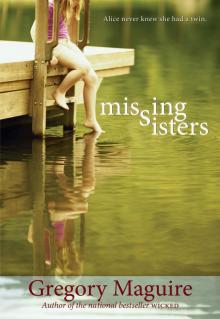 Missing Sisters
Missing Sisters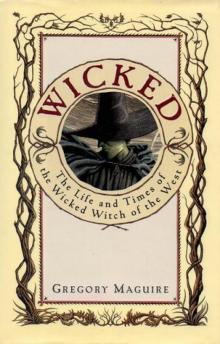 Wicked: The Life and Times of the Wicked Witch of the West
Wicked: The Life and Times of the Wicked Witch of the West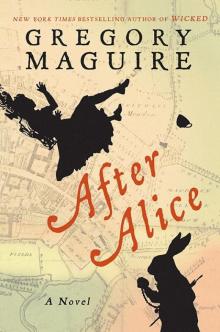 After Alice
After Alice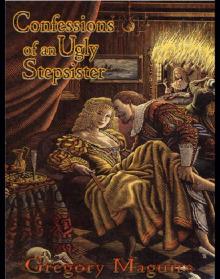 Confessions of an Ugly Stepsister
Confessions of an Ugly Stepsister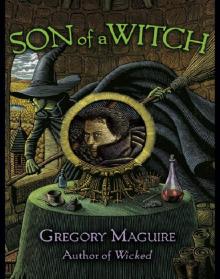 Son of a Witch
Son of a Witch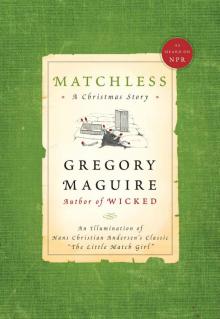 Matchless
Matchless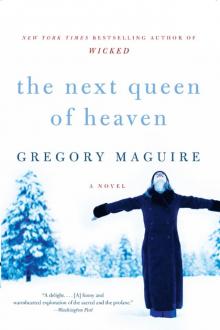 The Next Queen of Heaven
The Next Queen of Heaven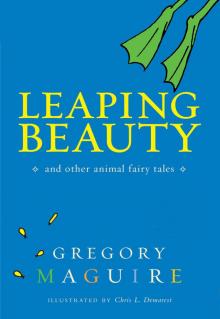 Leaping Beauty: And Other Animal Fairy Tales
Leaping Beauty: And Other Animal Fairy Tales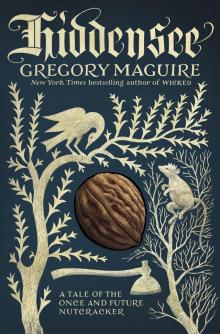 Hiddensee: A Tale of the Once and Future Nutcracker
Hiddensee: A Tale of the Once and Future Nutcracker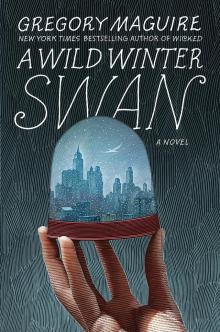 A Wild Winter Swan
A Wild Winter Swan Egg & Spoon
Egg & Spoon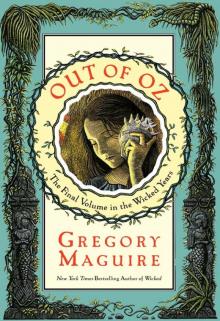 Out of Oz
Out of Oz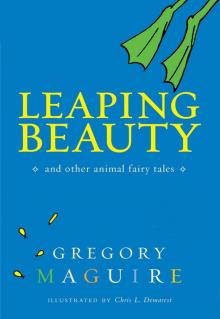 Leaping Beauty
Leaping Beauty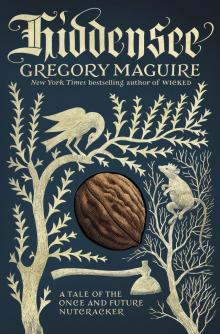 Hiddensee
Hiddensee The Wicked Years Complete Collection
The Wicked Years Complete Collection The Next Queen of Heaven: A Novel
The Next Queen of Heaven: A Novel